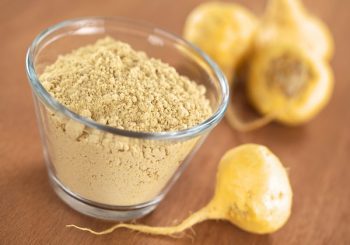 By Nikki Harper
By Nikki Harper
Contributing Writer for Wake Up World
New superfood trends and ideas come and go each year, but two you may have missed in 2019 are maca powder and watermelon seeds. The health-giving properties of both of these foods have been known for some time, but further research and greater public awareness has brought them to prominence this year in particular.
So, what is it about maca and watermelon seeds that makes them potential superfoods, and should you be adding them to your diet?
What is Maca?
Maca is a cruciferous vegetable – related to broccoli, cabbage and kale – which grows high in the Andes mountains of Peru. The dried root is usually ground into a powder and added to food or drink, and it has a distinctive earthy flavor which is something of an acquired taste.
Nutritionally, maca has a very strong profile. It is rich in potassium, calcium, vitamin B3, iron and copper, and it also contains many flavonoids and other plant compounds known to be beneficial to health [1].
What Does Research into Maca Tell Us?
Research into maca is in its early stages, with many studies so far having been done with animals rather than humans or using very small sample sizes. However, most of the research which has been done concludes that maca does have great promise for a variety of health issues [2].
Maca’s Benefits for Sexual Health and Fertility
Traditionally, maca is thought to be of great benefit in increasing libido, reducing sexual dysfunction and increasing fertility. Studies show far do bear this out. A twelve-week study found that maca did increase libido in men [3] with a 2010 review concluding that it is at its most effective following six weeks of ingestion [4]. A different review found that maca can increase sperm production and improve sperm quality in both healthy and infertile men [5], with obvious implications for fertility. A small study in 2009 found that maca can also help to reduce mild erectile dysfunction.
For women, there is some evidence that maca root can help to reduce sexual dysfunction which has been caused by antidepressant use [6].
Maca’s Benefits for Managing Menopausal Symptoms
A review in 2011 found that maca root powder can be effective in managing the more problematic issues for menopausal women, including hot flashes, mood swings and insomnia [7]. A further study in 2015 found that maca can help to reduce depression in postmenopausal women [8].
Maca’s Benefits for Energy and Endurance
Research here is in its early stages, but a 2009 pilot study did find that maca improved performance in cyclists [9]. There are some animal studies which suggest a link to improved endurance. Given that maca had adaptogen properties [2], it could well be that it assists the body in overcoming physical and mental stress and boots the immune system, which would contribute to increased energy, endurance and performance.
Maca’s Benefits for Memory and Brain Health
Maca is traditionally used in Peru to help school children to concentrate. Evidence does suggest a link to potential memory improvements, as a study on mice concluded [10]. There is also some evidence that maca may play a neuroprotective role [11] which could be of interest in the treatment of Alzheimer’s and other neurodegenerative diseases.
Should You Add Maca to Your Diet?
There are clearly some major potential health benefits to maca root. However, maca should not be taken by people suffering from thyroid difficulties, since like all cruciferous vegetables it contains goitrogens which may interfere with normal thyroid function [1].
If you don’t have thyroid issues, you could try maca in a variety of recipes like this delicious smoothie.
What About Watermelon Seeds?
If you’re a picky eater, you probably try to avoid watermelon seeds in your slice of watermelon. But these little packets of nutrition are actually hugely good for you. Low in calories but high in protein, watermelon seeds are rich in magnesium, iron, potassium and folic acid, as well as phosphorous, zinc and flavonoids.
How Do Watermelon Seeds Benefit Our Health?
For a start, watermelon seeds are a valuable source of magnesium. We need magnesium to produce energy, regulate blood sugar, synthesise proteins and support healthy nerve function, among many other things [12].
Watermelon seeds are also an important source of folate, which can help to prevent strokes or to prevent neural tube defects in growing embryos. Folate is also known to play a role in the prevention of cancer and heart disease, and in protecting against dementia and degenerative brain disease [13].
If you’re trying to lose weight, watermelon seeds are a fantastic snack. One third of a cup of roasted seeds provides 8g of protein, 3g carbs, 13g fat and only 150 calories [14]. The high protein level can help you to feel fuller for longer, paving the way towards sustainable weight loss [15].
The high levels of zinc in watermelon seeds can help to prevent or resolve acne [16] and the antioxidants and magnesium in watermelon seeds are also essential for good skin health.
Should You Add Watermelon Seeds to Your Diet?
Why not? These delicious, nutritious seeds have a host of health benefits and no known adverse effects. Most people don’t particularly like to eat them raw, but you can roast them to enjoy as a snack, or you can sprout them – during sprouting they will lose their shell, leaving you with all the goodness and none of the bitterness.
If you haven’t yet tried maca or watermelon seeds, why not give them a go?
Article sources:
- [1] https://www.bbcgoodfood.com/howto/guide/health-benefits-maca-powder
- [2] https://www.ncbi.nlm.nih.gov/pubmed/21977053
- [3] https://www.ncbi.nlm.nih.gov/pubmed/12472620
- [4] https://www.ncbi.nlm.nih.gov/pubmed/20691074
- [5] https://www.ncbi.nlm.nih.gov/pubmed/27621241
- [6] https://www.ncbi.nlm.nih.gov/pmc/articles/PMC4411442/
- [7] https://www.ncbi.nlm.nih.gov/pubmed/21840656
- [8] https://www.ncbi.nlm.nih.gov/pubmed/24931003
- [9] http://nrl.northumbria.ac.uk/2648/1/A%20pilot%20investigation%20into%20the%20effect%20of%20maca%20supplementation%20on%20physical%20activity%20and%20sexual%20desire%20in%20sportsmen.pdf
- [10] https://www.ncbi.nlm.nih.gov/pubmed/27648102
- [11] https://www.ncbi.nlm.nih.gov/pubmed/28007001
- [12] https://www.hindawi.com/journals/scientifica/2017/4179326/
- [13] https://ods.od.nih.gov/factsheets/Folate-Consumer/
- [14] https://www.livestrong.com/article/24243-health-benefits-watermelon-seeds/
- [15] https://jandonline.org/article/S2212-2672(16)00042-3/abstract
- [16] https://onlinelibrary.wiley.com/doi/abs/10.1111/dth.12576
Recommended articles by Nikki Harper:
- Harnessing the Power of Synchronicity
- Beyond 11:11 – The Significance of Repeating Number Patterns
- A Time to be Born and a Time to Die: Can Astrology Predict Death?
- Premature and Caesarean Birth: An Astrological Misinheritance?
- The Benefits of a Daily Divination Practice – and How to Start One
- 7 Ways to Find Awe in Your Everyday Life
- Need Answers? Looking for Insight? 7 Ways Astrology Can Help
- Alone But Not Lonely: 6 Amazing Benefits of Solitude
- Dancing in the Rain: 6 Reasons We Should All Be Pluviophiles
- Finding Time for a Daily Spiritual Practice – How and Why to Devote Your Time
- 7 Simple Steps to Start Communicating With Nature
- Getting Started with Remote Viewing: Step by Step to Strengthen Your Psi Abilities
About the author:
 Nikki Harper is a spiritualist writer, astrologer, and editor for Wake Up World. She writes about divination, astrology, mediumship and spirituality at Questionology: Astrology and Divination For the Modern World where you can also find out more about her work as a freelance astrologer and her mind-body-spirit writing and editing services. Nikki also runs a spiritualist centre in North Lincs, UK, hosting weekly mediumship demonstrations and a wide range of spiritual development courses and workshops.
Nikki Harper is a spiritualist writer, astrologer, and editor for Wake Up World. She writes about divination, astrology, mediumship and spirituality at Questionology: Astrology and Divination For the Modern World where you can also find out more about her work as a freelance astrologer and her mind-body-spirit writing and editing services. Nikki also runs a spiritualist centre in North Lincs, UK, hosting weekly mediumship demonstrations and a wide range of spiritual development courses and workshops.
Say hi at Questionology.co.uk or on Facebook.






